In its final season, Star Trek: The Next Generation was running out of ideas. The writers, knowing that the beloved series was coming to an end, were beginning to scrape the bottom of the ideas barrel. After countless episodes starring previously unseen family members and one with a candle sex ghost, the series stumbled onto a diamond in the rough: Lower Decks. An episode focusing on the junior officers of the USS Enterprise rather than the bridge crew. There’s an understandable fascination with the lowly workers in these grand franchises. Who was the janitor on the Death Star? How do ensigns feel when they see Captain Picard? Now, with CBS’s new animated comedy series, sharing the name and conceit of that TNG episode, we’re finally granted access to the bowels of a Starfleet vessel and offered the unique perspective of the lower ranks. And, as it turns out, they’re really fucking annoying.
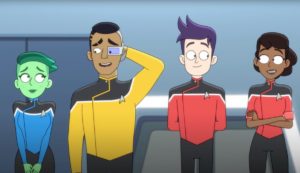 Set soon after Star Trek: Nemesis in 2380, Lower Decks follows the adventures of the USS Cerritos – one of Starfleet’s least important starships. Offering a swap of Star Trek’s usual formula, the senior officers are the supporting cast with the principal characters being low-ranking officers with menial jobs. These include Brad Boimler, a wannabe captain who’s determined to stick to Starfleet’s many, many rules; Beckett Mariner, a brilliant yet irreverent and abrasive rule-breaker with a responsibility problem; Tendi, an Orion who fangirls about getting to work on a starship; and Rutherford, an obsessive engineer adjusting to life with a Vulcan cyborg implant. Together they get up to adventures, either with or without the rest of the Cerritos crew, as they find their place in Starfleet and the galaxy at large, with humorous results. Apparently.
Set soon after Star Trek: Nemesis in 2380, Lower Decks follows the adventures of the USS Cerritos – one of Starfleet’s least important starships. Offering a swap of Star Trek’s usual formula, the senior officers are the supporting cast with the principal characters being low-ranking officers with menial jobs. These include Brad Boimler, a wannabe captain who’s determined to stick to Starfleet’s many, many rules; Beckett Mariner, a brilliant yet irreverent and abrasive rule-breaker with a responsibility problem; Tendi, an Orion who fangirls about getting to work on a starship; and Rutherford, an obsessive engineer adjusting to life with a Vulcan cyborg implant. Together they get up to adventures, either with or without the rest of the Cerritos crew, as they find their place in Starfleet and the galaxy at large, with humorous results. Apparently.
The most surprising aspect about Lower Decks is that it tells good stories and it tells them well. It may be trying to be a comedic take on Star Trek but the core narratives are always well-woven Star Trek tales, successfully examining the themes and ideas of the franchise, with a good balance between standalone and serialisation. There are tight character arcs that Mike McMahan and the other writers clearly laboured over, as well as just fun sci-fi ideas that wouldn’t go amiss in TNG. In fact, Lower Decks may tell the best stories of all the modern Star Trek shows. The problem, and it’s a pretty big problem, is the humour. The comedy isn’t good. No, more than that, it’s actually actively annoying.
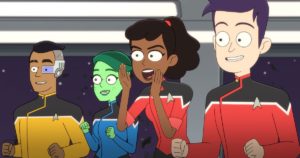 Granted, comedy is likely the most subjective genre of all. And, in truth, I just don’t like these types of American animated comedies anyway. I find them to be migraine-inducing. Just lots of shouting and a lightning-fast pace. Even Rick and Morty, an undeniably brilliant series, is struggle for me to sit through. Lower Decks is not only in this vein of comedy but might be the most bombastic example of it I’ve experienced. Not a single character talks normally, instead shouting every line, and the classic A, B, and occasionally C plots of Star Trek episodes of old reappear here but crammed into a 22-minute runtime.
Granted, comedy is likely the most subjective genre of all. And, in truth, I just don’t like these types of American animated comedies anyway. I find them to be migraine-inducing. Just lots of shouting and a lightning-fast pace. Even Rick and Morty, an undeniably brilliant series, is struggle for me to sit through. Lower Decks is not only in this vein of comedy but might be the most bombastic example of it I’ve experienced. Not a single character talks normally, instead shouting every line, and the classic A, B, and occasionally C plots of Star Trek episodes of old reappear here but crammed into a 22-minute runtime.
While Lower Decks shares its DNA with other modern animated comedies it also obviously shares some with Star Trek. And it wants you to know that constantly. The series isn’t content with just existing in that world and drawing connections when logical, it literally screams references at you non-stop. That’s right, not ten seconds pass by without a character yelling about the events of a past show in a manner which makes them seem like a rabid fan of the franchise rather than a character existing naturally within it. Lower Decks takes juvenile joy in simply mentioning past characters without much reason and the constant bombardment gets in the way of the narrative. And it’s just not funny. Whenever Mariner – the worst offender – began screaming another list of references I had to reach for the mute button and watch the show like I was Riva from Loud as a Whisper. There, I made a Star Trek reference. I must be funny.
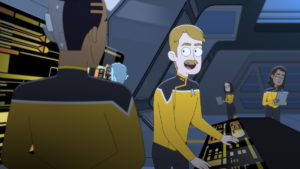 This is not to say Lower Decks is devoid of any good humour. The amusing jokes are just few and far between. While the bounty of references are Star Trek specific jokes done poorly, I think the series early on does a great job of using Starfleet positivity and acceptance as a joke, subverting the usual comedy tropes. For example, Rutherford is terrified of what the chief engineer’s reaction will be when he reveals he’s planning on switching to the command track. The joke is that, while the scene builds as if he’s going to erupt, the chief is totally fine with it. He’s happy for Rutherford because he’s a Star Trek character in this seemingly utopic reality. I love the idea of mining humour from the attitude of Starfleet while also being in keeping with that attitude. It’s a shame then that as we get to know them, the senior staff turn out to be assholes.
This is not to say Lower Decks is devoid of any good humour. The amusing jokes are just few and far between. While the bounty of references are Star Trek specific jokes done poorly, I think the series early on does a great job of using Starfleet positivity and acceptance as a joke, subverting the usual comedy tropes. For example, Rutherford is terrified of what the chief engineer’s reaction will be when he reveals he’s planning on switching to the command track. The joke is that, while the scene builds as if he’s going to erupt, the chief is totally fine with it. He’s happy for Rutherford because he’s a Star Trek character in this seemingly utopic reality. I love the idea of mining humour from the attitude of Starfleet while also being in keeping with that attitude. It’s a shame then that as we get to know them, the senior staff turn out to be assholes.
I do find the interactions between the lower-ranking crew and the senior officers to be problematic in the series. Firstly, I feel like each of the ‘lower deckers’ would be fired, transferred or demoted if the ever acted like they do here in an episode of TNG, but I can get over this considering it’s supposed to be a comedy. But the series also undermines its character drama and development for a cheap final joke. After Mariner and First Officer Ransom finally come to an understanding, there’s a final joke which makes them despise each other again. Tendi learns she doesn’t need everyone to like her over the course of an episode, only to be undercut at the end when she goes back to her old self. The series relies heavily on ‘the reset button’, at least until the finale shakes everything up, but more on that later.
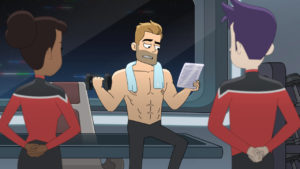 Lower Decks wants character development but then undermines it for a gag. In several ways, the series wants to have its cake and eat it too. At one point, after 22-minutes of arguing, the bridge crew agree to be more transparent with those in lower decks but then the ensigns ask too many questions and it’s back to square one when the credits roll. It makes everything seem pointless. This wouldn’t be a significant issue if the show was funny and could get by as a comedy but as it stands it just adds insult to injury when everything is thrown away at the end. Shockingly, the show works best as a drama and a classic-style Star Trek series, with the comedy often getting in the way.
Lower Decks wants character development but then undermines it for a gag. In several ways, the series wants to have its cake and eat it too. At one point, after 22-minutes of arguing, the bridge crew agree to be more transparent with those in lower decks but then the ensigns ask too many questions and it’s back to square one when the credits roll. It makes everything seem pointless. This wouldn’t be a significant issue if the show was funny and could get by as a comedy but as it stands it just adds insult to injury when everything is thrown away at the end. Shockingly, the show works best as a drama and a classic-style Star Trek series, with the comedy often getting in the way.
Resetting at the end of each episode is just a part of how these types of comedies work but the issue is the show being canon. Are these characters truly in the same galaxy as TNG? It doesn’t feel like it. They don’t act like it. Lower Decks is trying to strike a difficult balance. It wants to be a believable enough Star Trek show that it fits into canon and can share a universe with the shows it’s madly in love with but also be a funny comedy show that blasts open the tropes of Star Trek. It simultaneously can’t be too cynical because then it’s not Star Trek but it also can’t be too sycophantic because then it doesn’t work as a comedy that, to some extent by its very nature, needs to mock Star Trek and its conventions. Given what the show throws at you in its first eight episodes, I think it can do one or the other, yet as it stands it too often feels like the worst of both worlds.
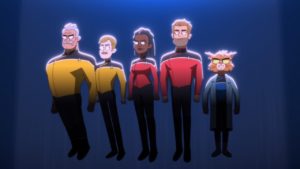 Veritas, the season’s eighth episode, is the perfect example of the show’s strengths and flaws. It’s a fantastic idea for the show. Remixing several story formulas from Star Trek of old, it’s a trial episode with a comedy twist. The lower decks crew have to testify in an alien court about the actions of their superiors, but the issue is that they have no idea what the bridge crew’s mission was. It pokes fun at how only the same small group and characters in previous series took part in adventures and the hundreds of other crewmen aboard wouldn’t have a clue what’s going on. They just find themselves in the middle of a battle without context. But Veritas is torpedoed by constant shouting. This episode takes it to another level. It’s so loud. And the references. So many useless references. Q appears. There’s a Salt Vampire. An argument about Roga Danar. A Gorn wedding. If Lower Decks is canon then these characters have no reason to reference these things in the way they do. It’s as if they’ve watched the episodes and are fans rather than characters, almost breaking the fourth wall. It’s irritating.
Veritas, the season’s eighth episode, is the perfect example of the show’s strengths and flaws. It’s a fantastic idea for the show. Remixing several story formulas from Star Trek of old, it’s a trial episode with a comedy twist. The lower decks crew have to testify in an alien court about the actions of their superiors, but the issue is that they have no idea what the bridge crew’s mission was. It pokes fun at how only the same small group and characters in previous series took part in adventures and the hundreds of other crewmen aboard wouldn’t have a clue what’s going on. They just find themselves in the middle of a battle without context. But Veritas is torpedoed by constant shouting. This episode takes it to another level. It’s so loud. And the references. So many useless references. Q appears. There’s a Salt Vampire. An argument about Roga Danar. A Gorn wedding. If Lower Decks is canon then these characters have no reason to reference these things in the way they do. It’s as if they’ve watched the episodes and are fans rather than characters, almost breaking the fourth wall. It’s irritating.
For most of the season the majority of my issues were personified by Mariner. While several characters share these traits, she’s by far the loudest, brashest, rudest, and most reference-spouting character on the show. However, I remember back to the first time I watched my favourite Star Trek series, Deep Space Nine, and being similarly annoyed by Major Kira. She too began the series a little too brazen and argumentative, to the point where it felt unnatural and distracting, but that all changed with the first season’s penultimate episode ‘Duet’. That masterpiece did wonders for Kira and from then on, she became one of the all-time best Star Trek characters, and still retained her fiery nature. Surprisingly, the penultimate episode of Lower Decks does the same for Mariner.
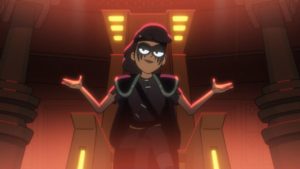 The episode, Crisis Point, parodies the Star Trek movies with great effect. With the use of the holodeck, we get a brilliantly long flyby sequence of a shuttlecraft approaching the Cerritos; a very Motion Picture-like score; a villain endlessly quoting Shakespeare; lens flares; characters commenting on how you can do all sorts of weird beaming stuff in a movie; and many, many more references. The vital element that makes these references work when so many in the series don’t is that you either get them or you don’t. They are not literally shouted at you and don’t draw too much attention. If you get the joke then great and if not, the show isn’t going to pause and scream at you until you do.
The episode, Crisis Point, parodies the Star Trek movies with great effect. With the use of the holodeck, we get a brilliantly long flyby sequence of a shuttlecraft approaching the Cerritos; a very Motion Picture-like score; a villain endlessly quoting Shakespeare; lens flares; characters commenting on how you can do all sorts of weird beaming stuff in a movie; and many, many more references. The vital element that makes these references work when so many in the series don’t is that you either get them or you don’t. They are not literally shouted at you and don’t draw too much attention. If you get the joke then great and if not, the show isn’t going to pause and scream at you until you do.
Not only does the comedy land but the character work does too. We get to finally truly understand Mariner. Her brilliant nature offset with relatable flaws as she struggles with responsibility and the burdens that Starfleet officers must face. Her boisterous façade is dropped and she’s revealed to be a genuinely great character. All this from a holodeck therapy session where she eventually has to fight another version of herself. It’s one of my favourite uses of the holodeck in all of Star Trek. While we eventually understand why Mariner acts in the brazen ways she does, and its great character work, explaining why she was previously annoying doesn’t excuse just how annoying she was in those episodes. I hope this character progression doesn’t disappear when the show returns for season 2, wiped away with a sly joke like in the early episodes.
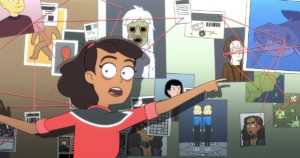 I was again shocked by how much I enjoyed the season finale. While there’s still the usual display of lacklustre jokes, it places a lot of focus on the plot, which I wish the show did more often. Again, the show tells good stories and this is a great finale, successfully tying up each main character’s arc for the season. I may not have enjoyed the journey but the destination is very satisfying and enjoyable. Gone too is the reset button. The finale shakes things up to a huge extent and promises a very different second season. And the references? They’re still there but rarely do they make a big deal of it. It finally feels as if the show simply just exists in the Star Trek galaxy without constantly telling you so. Lower Decks finds the balance it desperately needed by the final episodes, but it was a painful process getting there. And my ears still hurt.
I was again shocked by how much I enjoyed the season finale. While there’s still the usual display of lacklustre jokes, it places a lot of focus on the plot, which I wish the show did more often. Again, the show tells good stories and this is a great finale, successfully tying up each main character’s arc for the season. I may not have enjoyed the journey but the destination is very satisfying and enjoyable. Gone too is the reset button. The finale shakes things up to a huge extent and promises a very different second season. And the references? They’re still there but rarely do they make a big deal of it. It finally feels as if the show simply just exists in the Star Trek galaxy without constantly telling you so. Lower Decks finds the balance it desperately needed by the final episodes, but it was a painful process getting there. And my ears still hurt.
Star Trek: Lower Decks is a well-plotted and well-meaning addition to the franchise too often brought down by its hyperactive nature, the sheer volume of references, and the volume of the characters screaming those references. Yet its problematic aspects can clearly, easily be improved. This isn’t like Discovery which needs a major overhaul of how it tells its stories. The storytelling core of Lower Decks is great; it’s the sugary sweet outer layer which is the problem. The final two episodes of the season are a huge improvement over the preceding eight and I’m shocked just how quickly my opinion changed on the show when it fixed its issues. I only hope now that the writers remember what they have learned and the second season maintains this momentum and continued improvement.
Essentially, my thoughts on Star Trek: Lower Decks can be summed up by one quick interaction from the show itself:
“Sometimes you can be not annoying”
“Yeah, sometimes you can be not annoying too”.
Have you watched Star Trek: Lower Decks? Do you feel I’m being unfair and overly grumpy with what is supposed to be a fun, silly comedy series? Let me know in the comments and be sure to geek out with me about TV, movies and video-games on Twitter @kylebrrtt.




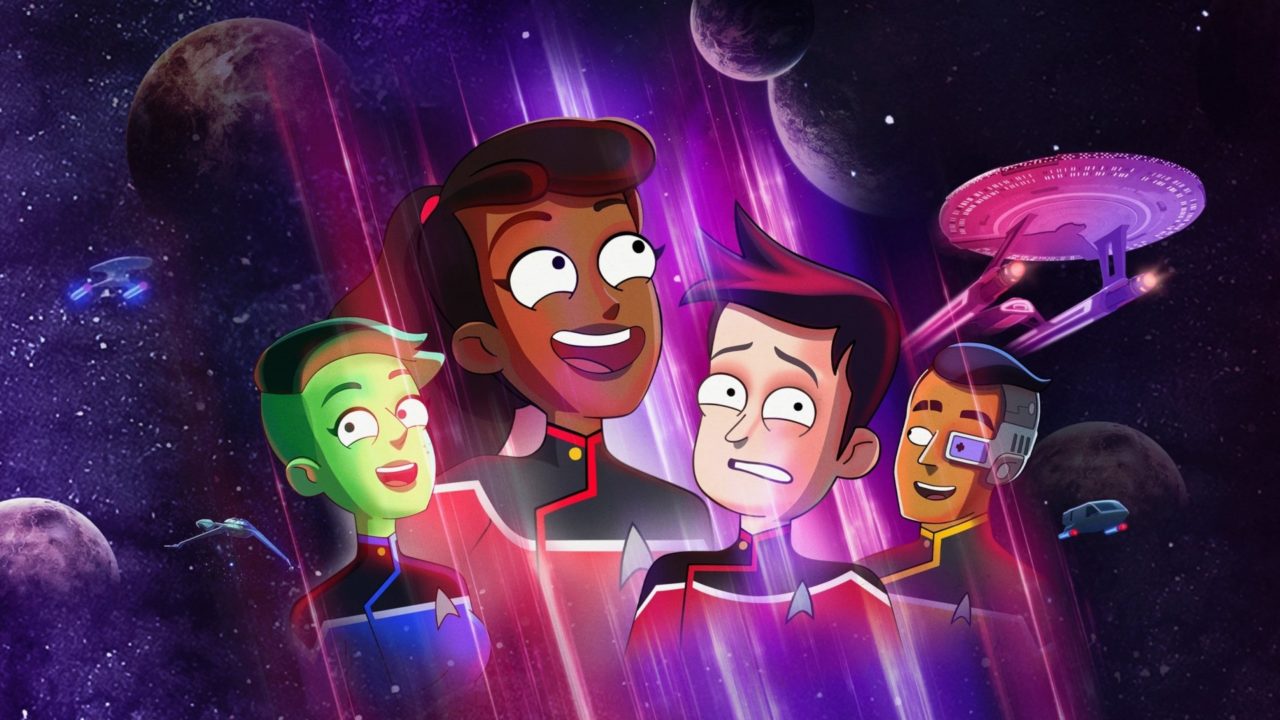
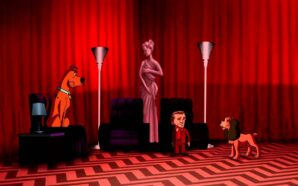


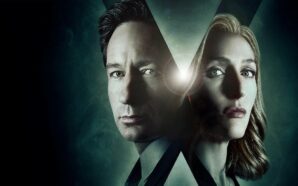
Good and well thought out analysis that is spot on. The show did way too many references of past Trek. The rapid fire comedy which seems to be a staple, at least in the US, is annoying as are the characters. I tend to agree that the final episodes did make the show more tolerable.
It is interesting that the sci-fi aspects in here are, at least in my opinion better than the all of the jumble of plots in Discovery and Picard.